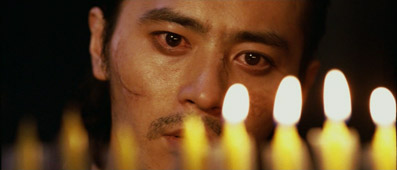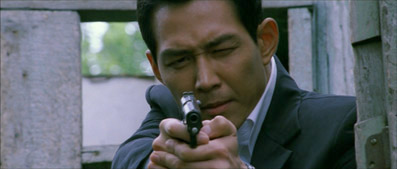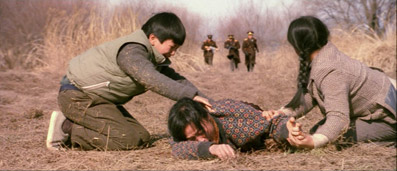|
In
1983 Beijing, a family of North Koreans seeks asylum at the
Austrian embassy, but South Korean government official Park
Wan-sik recommends refusal. Twenty years later, a container ship
carrying nuclear missile guidance systems is ambushed and
its crew is slaughtered by an armed group of modern-day pirates.
What's the connection? Aha... At the South Korean National
Intelligence Service, ex-Navy SEAL Lt. Kang Se-jong is hauled
away from his sports practice for special assignment. He's
the ideal man for this job, we are told, because he speaks
fluent English and once sank a North Korean ship in what
is categorised vaguely as "an incident." The man
he's been charged with hunting out, the leader of this band
of pirates, is named Choi Myung-sin, or Sin as he's known.
He's every bit as deadly as his nickname suggests, but at least there aren't seven of him.
Se-jong
jaunts off to Thailand and approaches arms dealer Peter
in an effort to locate the pirate, but has to do a deal
to let a cargo of immigrants through customs before he is
allowed to accompany him to Shanghai. Peter's attempt to
dump Se-jong at the airport seriously underestimates this
soldier's brutal determination, and in no time at all the
hapless arms dealer is alone with Se-jong and being shot in
the leg for answers. He gives them. Trouble is, Sin is already
on the streets of Busan, having been transported there in the very container
lorry that Se-jong let through. He has a score to settle
with the aforementioned Park Wan-sik, whom he follows into
a bathroom and kills with a big knife. Sin, it turns out,
was the young son of the family that was refused asylum due to Park's
interference, and the consequences of that decision have
left him a bitter man. He's developed a serious grudge,
not just against Park and his ilk, but all of Korea, North
and South. Which is why he's buying enough black market
nuclear waste to wipe out the entire country.

Conservative
action filmmakers must miss the cold war, when all you had
to do to create a bad guy was give him a frown, a thick Russian
accent, and have him call everyone comrade, and when your
heroes could fly the flag of domestic values as they slaughtered
the ideologically incorrect. The subsequent shift in world politics doesn't seem to have caused
director Kwak Kyung-taek any sleepless nights, at least
not if Typhoon [Taepung] is anything to go by. His hero may be cheerless, but he's
good looking, patriotic and right thinking. And his loves his
mother. He also misses his departed father, an ex-Lieutenant
Colonel to whose grave he visits to share thoughts like
"Father, you always said that a soldier should maintain
his honour, even when his country is being put to the test."
And he's from South Korea, while the evil Sin is from the
North. And who is it that's supplying the nuclear waste
to these terrorists and has had Sin's long lost and terminally
ill sister Myung-jyu working as an army prostitute all these
years? Why it's those damned Ruskies.
Before
I go too far down this road I should point out that the
politics of Typhoon are neither as clear
cut nor one sided as this lampooning might suggest. In Typhoon's
book, just about every nation is guilty of something, South
Korea of colluding to refuse entry to the refugees, the
North of killing most of them, the Russians of dodgy nuclear
dealing, Pakistan of trading in the same, and the Chinese
of getting into bed with the Russians. The Americans, meanwhile,
have been covertly pointing missiles at Korean turf and
want to torpedo Sin's nuclear boat to cover up all evidence
of the affair. The only pure hearts belong to the ordinary
South Koreans and their fighting men, upholders of
ideals to which we should all aspire. Oh sorry, my cynicism
just keeps popping up.
Despite
the parody potential of having a bad guy named Sin (which
can't help but recall The Evil Team from Shaolin
Soccer), the character himself proves to be a lot
more sympathetic than you might expect. OK, wiping out an entire
nation may be overreacting a little, but as the sometimes
extensive and involving flashbacks illustrate, he has damned
good reason to be pissed off at the world. The problem with this is that
he later proves a lot more interesting and likeable than
the film's supposed hero, Se-jong, a humourless Dudley Do-Right
with all the charm and personality of a varnished fence
post. This imbalance puts a peculiar slant on the climactic
military assault led by Se-jong on Sin's boat, as a platoon
of expensively equipped automatons stomp through the vessel
slaughtering everyone in sight. I watched the scene with
the same sense of moral confusion that I would if asked
to cheer a heavily armed Nazi stormtrooper raid on a French
resistance cell. In what is presumably supposed to be a
triumphant moment, a soldier armed with an automatic weapon,
night vision goggles and body armour shoots the slow-mo shit
out of a pirate waving only a sword, and I found myself
hoping against hope that is gun would jam and blow up in
his self-righteous face.

Clearly
hoping to take on Hollywood at its own game, director Kwak
keeps the pace brisk, the emotions loud, and the subtlety
locked in the closet. Action scenes are staged with noisy
but sometimes exciting aplomb, while a sense of scale is
created by some medium-large set-pieces and a narrative that
hops from country to country like a bionic flea on an accelerated
package tour. There's more than a whiff of Bond in the preposterous
scheming of the villain and even a few bars of the otherwise
generic score, but not even a hint of the wit or dark humour
that characterised even the more lightweight 007 outings.
Similarly, the suggestion that Se-jung and Sin have some
kind of underlying kinship may nod at late Hong Kong era
John Woo, but it feels here like an ill-developed bolt-on
rather than in any way integral to the narrative. Working
out their differences in the name of brotherly love is just
never on the cards for this pair.
A busy, energetically staged but largely unexceptional actioner
that ultimately slips towards silliness (I can't be the
only one who laughed out loud at Se-jong's proclamation
that Sin was only planning to wipe out Korea to get attention),
Typhoon's nationalistic fervour is unlikely
to work that well for an international audience, although
its loud bangs and fast chases should still register. I
salute Kwak's attempt to kick against the genre's usual
one-dimensional characterisation by humanising the traditionally
cardboard supervillain, but by failing to do likewise with
the notional good guy he inadvertently directs audience
sympathies towards the very people we're supposed to want
to see stopped at any cost.
A
footnote. Although the version submitted to the BBFC was
passed uncut both for cinema and video distribution, the
extra features do reveal a missing sequence whose absence
is felt in the film as it stands. In one of the flashback
scenes, the young Myung-jyu raids a large quantity of pork
buns from a farm, but when she returns to her brother she
is unhappy, dishevelled and her bounty has clearly been
reduced. In the first documentary on disc 2 we see the filming
of part of the missing footage, where Myung-jyu is caught
stealing by the farmer, who goes to hit her, then instead drags her protesting into a
darkened room, presumably to rape her. This absent
sequence helps clarify detail in the scene as it now stands
and adds to the poignancy of Sin's back story, already film's
strongest element. Whether this was deleted by Kwak before
the film's Korean release or removed for international prints
is uncertain.
In
common with the big budgeted Hollywood actioners it apes,
Typhoon looks damned good on DVD, the 2.35:1
anamorphic transfer displaying impressive sharpness, excellent
contrast and black levels and strong colour reproduction,
within the judgement limitations of the creative colour
tinting popular in modern action thrillers.

Two soundtracks are available, 5.1 surround and DTS surround,
both the original Korean (with bits of English and Russian
and even Thai). Comparing the two is actually like comparing
a Dolby 2.0 track with a 5.1 on some other discs, so dramatic
is the difference in volume, spread, bass and all around
wallop. When the action gets going you'll really know about
it on the DTS track and so will your neighbours – automatic
gunfire in particular rains at you from every direction,
while the rumbling of the US submarine should get the ornaments
on the move.
Unless you count the trailer for 9th
Company on disc 1 (I don't), the extra features
are all on disc 2.
The
Making of 'Typhoon' (47:10)
Actually titled Eye of the Storm: The Making of Typhoon,
this is an engaging and educational look behind the scenes
that includes interviews with director Kwak Kyung-teak and
members of the crew and cast (one of whom, Min Je-hwan,
cheerfully reveals that this is the seventeenth movie he's
died in, and the second this year!). This is where you'll
find the filming of that missing sequence detailed above,
but it's the punishment the actors and crew are put through
for the final, ship-in-a-typhoon sequence that is the most
eye-widening.
Star
Power (20:38)
Split evenly between interviews with lead actors Jang Don-gun
and Lee jeong-jae, who discuss their initial involvement
with the film, their characters and their approach to individual
scenes, plus more on-set footage. Both cover the difficulties
of the climactic fight, which was done with knives on a
moving gimbal as water was being poured on to them.
Production
Diaries (36:41)
A detailed look at the work of the production design and
effects team, which includes more coverage of the gimbal
set and the constructed miniatures of the boat, submarine
and helicopters and collection of weapons made by the props
team that you'd easily mistake for the real thing. This
is a particularly worthwhile extra that really shows the
work that goes on behind the scenes on such a film, something
they individually hope will be appreciated.
Action
movie fans sometimes make few demands of story, in which
case the flashback scenes here, which for my money are
the best bit of the film, will probably seem like baggage between
the blasts, but if you're watching for pace and incident
alone then Typhoon has a fair amount to
recommend it. For the rest of us, those issues of uneven
character development, sentimentality and head-held-high
nationalism make the film an interesting but largely unfulfilling
miss, despite some well done scenes. No problems with the
disc, though – Premiere Asia have delivered on picture and
sound and those three documentaries are well worth the look
even if the film leaves you unsatisfied.
|